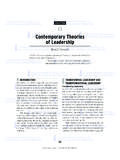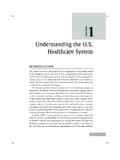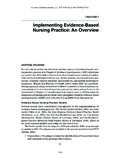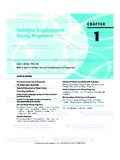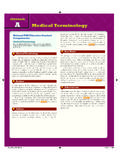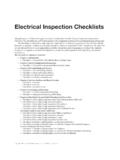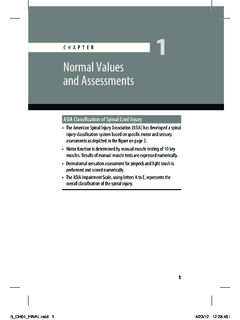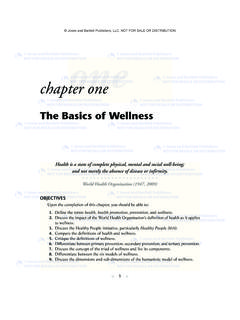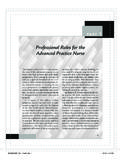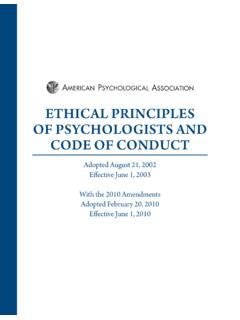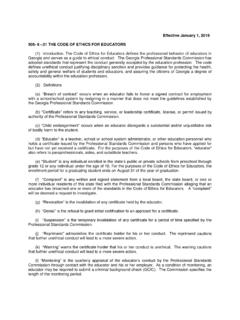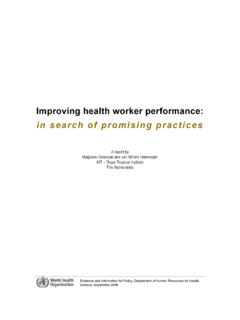Transcription of ethics in Professional Nursing Practice
1 3. ethics in Professional Nursing Practice Janie B. Butts WDG Photo/Shutterstock Nursing is a profession that has its own code of conduct, its own philosophic views, and its own place in the health care team.. Nurses work under their own license. That means that nurses are completely responsible for their work. Janet r. Katz, A Career in Nursing : Is It Right For Me? This article was published in A Career in Nursing : Is It Right For Me?, Janet R. Katz, p. 105, Copyright Elsevier 2007. Objectives After reading this chapter, the reader should be able to do the following: 1. Differentiate Nursing ethics from medical ethics and (2) communication: mindfulness and effective bioethics. listening; and (3) concern: advocacy, power, and 2. Delineate key historical events that led to the culturally sensitive care. development of the current codes of ethics for 8. Contrast moral distress from moral integrity.
2 The American Nurses Association (ANA) and 9. Recall ways to discern when a nurse fits Aristotle's International Council of Nurses (ICN). description of the truthful sort. 3. Describe Professional Nursing boundaries and ways 10. Define truthtelling in relation to three ethical frame- nurses cross those boundaries. works: deontology, utilitarianism, and virtue ethics . 4. Review the concept of Nursing as praxis. 11. Examine the Nursing ethical implications involved 5. Propose scenarios that require a stench test before when a physician, through exercising therapeu- the nurse can make an ethical decision. tic privilege, does not disclose the whole truth 6. Summarize the three major Nursing ethical to a patient who is in the process of dying with competencies: moral integrity, communication, cancer. and concern. 12. Devise two or three scenarios that would prompt a 7. Discriminate among the ethical competencies that nurse to respond with moral courage.
3 Comprise each major ethical competency: (1) moral 13. Describe the significance of communication in integrity: honesty, truthfulness and truthtelling, relation to the connection between mindfulness benevolence, wisdom, and moral courage; and effective listening. 71. 71 09/03/15 8:06 pm 72 Chapter 3 ethics in Professional Nursing Practice Objectives 14. Relate patient advocacy and power to nurses' 18. Evaluate nurses' use of social networking in everyday ethical work. terms of the ANA guidelines for Professional 15. Formulate an assessment plan for a culturally ethical conduct. diverse patient who is newly admitted to a 19. Imagine two or three incidents of social media hospital. use in which a nurse violated the ANA Code of 16. Characterize two types of relationships: ethics for Nurses with Interpretive Statements. the nurse physician relationship and the nurse nurse relationship. 17.
4 Explain how nurse recipients of horizontal violence progress to the walking wounded, then transform to the wounded healer. Introduction to Nursing ethics Nursing professionals from the very early years constructed the meaning of nurs- ing around ethics and ethical ways of caring, knowing, and acting. The meaning and scope of Nursing ethics expanded as a result of unique Nursing issues, but the road to a greater Nursing voice has not been easy. Bioethical issues are relevant to nurses' work in everyday Practice , yet in matters of bioethics nurses are not always autonomous decision makers. During the birth of bioethics from 1947 to the 1970s, nurses' voices were left out of the dialogue of ethics . Complex ethical issues in medicine prompted in-depth medical ethics discourse among physicians, philosophers, and theolo- gians. Pinch (2009) noted that mainstream ethics was slow to recognize and include the voices of nurses as both scholars and practitioners who faced innumerable dilemmas in health care.
5 [but] this lack of widespread acknowledgement did not mean that the profession of Nursing failed to address ethical issues in Practice . (pp. 238 239). Nurses began to place emphasis on particular ethical issues that stemmed from complicated bioethics, such as pain and suffering, relationships, and advo- cacy. In fact, nurses led the way in the 1980s in conducting empirical research on ethical issues (Pinch, 2009). These initiatives strengthened Nursing 's role in bioethics. 72 09/03/15 8:06 pm Introduction to Nursing ethics 73. Today nurses in all roles engage in ethical decision making and behaviors arising from morality, relationships, and conduct issues surrounding patient care and in relationships with each other and other healthcare professionals. Some experts support the view of Nursing ethics as distinctive from bioethics in other disciplines (Fry, Veatch, & Taylor, 2011; Holm, 2006; Volker, 2003; Wright &.)
6 Brajtman, 2011). Additional views indicate everyday ethical Practice in Nursing as being situated within an interdisciplinary team. Johnstone's definition of Nursing ethics (2008) is consistent with the percep- tion of a strong connection between Nursing ethics and Nursing theory, which distinguishes Nursing ethics from other areas of healthcare ethics . Johnstone (2008) defined Nursing ethics as the examination of all kinds of ethical and bio- ethical issues from the perspective of Nursing theory and Practice , which, in turn, rest on the agreed core concepts of Nursing , namely: person, culture, care, health, healing, environment and Nursing itself (p. 16). The Nursing profession embraces all of the roles that characterize Nursing , whether in Practice or not. Nursing ethics permeates all of those Nursing roles. Nurses' Professional relationships in patient care and within the healthcare team bring about ethical issues that are unique to Nursing .
7 Effective praxis in Nursing requires nurses make morally good decisions with indistinguishable means and ends to follow through with those decisions; nurs- ing as praxis means ethics is embedded in Practice and all activities of Nursing . For everyday ethical decision making in work roles, nurses should begin by first referring to the Code of ethics for Nurses with Interpretive Statements as a nonnegotiable guide for ethics (see Appendix B) then branch out for more sup- port, as needed, to other literature and experts on the topic. Taking an e thical stance is always about justifying the chosen position by backing it up with s upport from codes of ethics , moral experts, and the premium and original literature on ethical topics; this position is threaded throughout this text. Moral philosophers argue in a highly complex structure in venues, such as in moral philosophy arti- cles or verbally, for and against various issues.
8 As nurses, it is not plausible to come to a strong justified position about an ethical dilemma or issue without substantially more in-depth reading and without wide-ranging consideration of the historical arguments within the moral philosophy and b ioethical literature. For good ethical decision making through praxis, nurses must be sensitive enough to recognize when they are facing seemingly obscure or uncomfortable ethical issues in everyday work. One such obscurity occurs when a nurse, such as a novice graduate, feels extreme pressure to conform to a hospital administrator's less than morally desirable decision over an action that would sustain the nurse's own moral integrity. 73 09/03/15 8:06 pm 74 Chapter 3 ethics in Professional Nursing Practice Research Note: Laabs's Study on New Graduates' Perceptions of Moral Integrity In 2011 Laabs explored how newly graduated bac- leads to moral distress and burnout.
9 The ethical calaureate-prepared nurses perceive moral integrity challenge for new nurses is learning how to main- and how prepared they feel to manage challenges. tain moral integrity and preserve mutual respect The new graduates described a person with moral in an environment that trivializes and discounts integrity as a person practicing virtue ethics , acting nurses' work as an important contribution to care. like, becoming, and being a certain kind of person Nurses who act contrary to their own values and who was honest, trustworthy, consistently doing beliefs to do what another person asks of them and standing up for what is right, despite the con- without questioning are at risk of becoming morally sequences but, paradoxically, they also perceived desensitized to their own conscience. Some nurses the expectations of administrators were for nurses actually begin to think they will never be the kind of to set aside their values and beliefs and do what ideal, moral nurse they aspired to be.
10 Others ask, even if this would mean acting contrary Source: Laabs, C. (2011). Perceptions of moral integrity: to their conscience (2011, p. 431). These confound- Contradictions in need of explanation. Nursing ethics , ing statements form a level of dissonance, which 18(3), 431 444. Ethical Reflection Kidder (1995) introduced nine checkpoints for action have a smell of moral wrongdoing, such ethical decision making. In his checkpoint for as something a person feels not quite right, feels right versus wrong issues, he provided four ways wrong or uncomfortable, has an air of corruption, for people to test for actions of wrongdoing. One or makes one cringe? If the answer is yes, nurses way is the intuition test, also known as the stench probably should not engage in the action. Nurses test. Some actions or solutions do not pass a will develop a more intense moral sensitivity when nurse's stench test.
